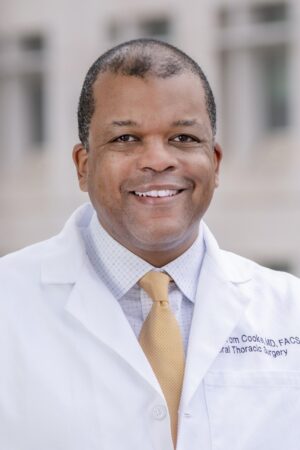Building vaccine trust in communities of color
The following article was published by Dr. David Tom Cooke in the UC Davis Health “Friday Update” employee newsletter on Jan. 29, 2021.
The COVID-19 pandemic has disproportionately hurt communities of color, who are more often than other groups to be skeptical of vaccines due to past abuses and histories. As health care providers, we need to better understand these points of view and find “trusted messengers” on vaccines for a successful fight against COVID-19.
Dear Colleagues,
Earning trust within communities of color is critical to a successful rollout of the COVID-19 vaccine, both here in Northern California and across the country.
The COVID-19 pandemic has disproportionately affected these communities. Data from the CDC shows that the death rates among Black and Hispanic/Latino people are much higher than for white people, in all age categories. This is largely due to health inequities that existed long before the pandemic that have exacerbated the effects of the virus. As an academic medical center, UC Davis Health is addressing health equity on many levels, including dedicated, culturally-competent patient care, scholarly research, the inclusive development of Aggie Square, and our Anchor Institution mission.
In terms of COVID-19, as health care providers we need to acknowledge this vaccine hesitancy in these communities, lead by example and role modeling, and take meaningful steps to get our communities as fully inoculated as possible as the vaccine becomes available.
Last week I discussed with an African American Faculty and Staff Association audience why I chose to participate in UC Davis Health’s recent Pfizer-BioNTech clinical vaccine trial. For me, it was a decision akin to my beloved grandmother’s choice to leave the Jim Crow South to relocate to California and work in the naval shipyards during WWII. In addition to seeking a better opportunity for her family, a sense of duty, doing her part for society, she was driven to contribute in a deeply patriotic way to America’s larger effort, despite the very imperfect nature of our society.
Decades later, I felt that to make a difference, especially for people of color during this global pandemic, I also needed to walk the walk, especially if I was going to talk the talk. That’s why I wanted to show others – through a shot in the arm at our well-run clinical trials here at UC Davis Health – that these vaccines are safe and effective.
As professionals working in Sacramento’s premier health care institution, we need to better understand the very real skepticism that many Black people have toward the medical profession. A long history of poor health outcomes and abusive research, unfortunately, characterizes this relationship. During the infamous Tuskegee experiment, Black men weren’t told nor treated by medical professionals that they had syphilis, and medical researchers used cervical cancer cells from Henrietta Lacks (HeLa cells) for billion-dollar projects without her consent nor compensation – and these are just two examples of such misdeeds.
So, I understand the distrust within the cultural DNA of the Black community and witness it firsthand on an everyday basis. Even some of my own family only agreed to plan to take the vaccine, when it became available to them, after learning that I had done so. They are not alone. A December survey showed 40% of Black people said they would not get COVID-19 vaccine shots, a higher percentage than white or Hispanic people. The same hesitancy about vaccines due to unethical practices in the past also exists in Native American communities.
Some may prefer to wait and see how safely the initial rollout fares. Still, COVID-19 vaccine skepticism – in communities or color and elsewhere – could really hamper our fight against this pandemic, which has killed almost 420,000 Americans to date. Most experts say that about 70% of the U.S. population needs to be vaccinated to achieve herd immunity and ultimately hold the virus in check.
What can you and I do? Know your value, as a health care professional. We need to engage in open and heartfelt conversations throughout communities of color, and beyond – with patients, friends, family, colleagues, among others. COVID-19 is not the first time vaccine mistrust has surfaced. Consider the flu vaccine: African Americans and Hispanic/Latino Americans have lower influenza vaccination rates than other demographics.
We all can help by ensuring that leaders in communities of color and tribal communities have opportunities, resources and cooperation to design and lead strategies to share information, increase vaccine confidence and receptivity, deliver and administer vaccines, and closely monitor and report on results. UC Davis Health is the type of socially-committed institution that you can draw upon to advance this conversation and address concerns – our coronavirus web site offers the latest vaccine news, information, research, and educational tips.
Let’s encourage a fully open, scientifically-grounded discussion where people in our communities, including the most vulnerable get their questions heard and answered about things like safety, efficacy and the development process. So much depends on “trusted messengers,” in particular health care workers, especially those of color, who can talk about vaccine facts and the science behind it all – with a sense of cultural dexterity, humility and compassion – to people who have questions or concerns.
This collective sense of duty (our naval shipyard) expressed at the individual level will help us prevail over this pandemic – and equitably protect those in our society who are most vulnerable. Thank you for standing with us!
Yours in health,
David Tom Cooke
Associate Professor
Head of the Section of General Thoracic Surgery
UC Davis Health



